#anarco capitalism
Note

Your spirit animal is a bull market and your attention span isn't short, it's just focused on the next opportunity
I am CEOpilled and capitalisms prettiest princess. I am five year plan and 4am yoga and make coffee at home embodied. I am the wolf of wallstreet and just like patrick bateman IRL. I have £14 in my bank account and 65 pence in savings
#Everytime i encounter a problem im either “i am the most anarco-communist person to have lived” or “i need to win capitalism right now”#On one hand i could go into fintech or be a quant. On the other hand i unfortunately am an economic leftist
11 notes
·
View notes
Text
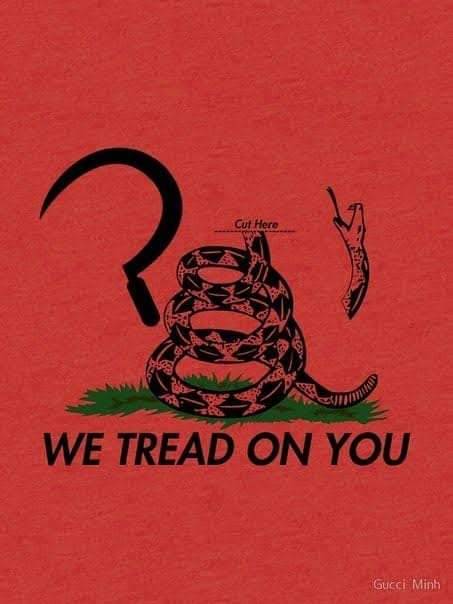
#anarchism#anarchy#socialism#anarcho capitalism#ancap#ancom#don't tread on me#don't tread on us#anarquismo#anarquia#socialismo#anarco capitalismo
42 notes
·
View notes
Note
Your blog is like a breath of fresh air. Thank you for all the wonderful thoughts and writing.
That said I actually have a question. I am pro-palestine(it feels stupid to call it that, as if it should even be a debate) and in a very left leaning friend group. But also a very white academic one. You know the type, read Marx, dream of the revolution but continue studying to end up in 9 to 5s instead of doing anything(I am guilty of it too, this isn't meant as insult just a description)
Anyways, as you can imagine they have been extremely hesitant when it comes to having any opinion on Israel or Palestine. That wouldn't be a problem in itself, I know how to start topics with them and get them thinking usually but in this case there is an additional problem. Whenever I try to broach the topic I get shutdown with "Look at all the shit that is going on here, our country is falling into fascism, I just don't have the energy to deal with this conflict. Please don't talk about it because it's triggering". And I have zero clue what to do. Forget getting them to go on protests with me, I can't even speak to them about it and feel really guilty. Its me bringing up a heavily triggering topic after all. It feels wrong to feel guilty though. I know at the end of the day it's not important if I could convince some people to give a fuck but do you have any advice? How to get over this guilt or maybe how to broach a topic with that considered?
My main problem is my fear of losing my friends because I have been ill for some time(as in physically unable to leave the house for more than a short grocery run, or my visits to the doctor, because of pain and my friends are what keep me alive) and losing their help would be not good.
My exact situation aside, do you have advice for someone to broach a topic that others describe as unpleasant/triggering without causing a huge rift in the group?
Thanks for your kind words and your question, Anon.
I think your friends suck and that you can do better than them. I think you should get out there and find yourself some Black, brown, working class anarchist and anarco-communist buds (and Marxists who show up for others in a real, observable way in their regular lives) as soon as you can.
I know that wasn't the answer you were looking for. But I have seen this kind of entirely theoretical, jaded, self-superior, passive, white well-off Marxist type a thousand times before, and I've failed to ever see them show up for other people in any kind of consistent way.
And it's not only the people systematically crushed beneath the wheel of Capital half a world away that they neglect, either. They tend to be pretty shitty friends and neighbors when it all comes down to it on the micro-level, too. Their smug over-intellectualism and dispassionate cynicism allows them to justify remaining disengaged and going along with the status quo in a way that ultimately serves capitalism very well.
There is a theoretical basis to this selfishness and disengagement, I will admit. This type of overly academic Marxist typically believes that the fall of capitalism is inevitable, that humans lack free will and only behave as befits their obvious material interests, and that there is nothing that one can do on a personal level to hasten any kind of Revolution, so there is nothing left to do but wait, and take care of oneself, and allow the future to unfold.
This is a perspective explicitly advocated for by people like the Chapo Trap House guys, and among academic white boy communist types, it is incredibly popular. I remember hearing Matt Christman saying on his vlogs that he essentially does not believe the conditions allowing capitalism to fall will happen in his lifetime, and so his only responsibility is to just take care of himself and his family and be comfortable.
Ultimately, these types wind up sounding and behaving exactly like capitalist economists who believe that everyone is rationally motivated only by increasing their personal wealth. They are disengaged from politics except insofar as they like to make snide jokes about current events for their own entertainment and enrichment, and they don't see themselves as having the capacity to exert a positive influence on the world, nor any obligation to. It's bleak shit.
At the same time, if your friends are in the circles that tend to read and listen to and promote this kind of stuff, surely they have also been exposed to popular leftist voices advocating loudly for the Palestinian cause. And yet still they have done nothing.
Hasan Piker has been vocally pro-Palestine his entire career, and his Twitch channel has been providing near constant coverage of Palestinian issues since October 7th. True Anon has had multiple episodes on the Israel Lobby, the suppression of pro-Palestinian activism and journalistic coverage, and has aired interviews with Normal Finkelstein. Palestine is the central topic of nearly every Trillbilly Worker's Party podcast for months now.
These are widely popular voices among the very types of Marxists that you say that your friends are, and many of these creators are close friends with the Chapo Trap House guys, whom your friends almost certainly are taking notes from. So it's nearly impossible to imagine that your friends have not encountered the near constant coverage of the struggle of the Palestinians that all the rest of us have. And yet still your friends do nothing. Still they do not care, and dismiss you when you share with them how despairing you feel.
Your friends have turned off an essential part of their hearts, I think. And I don't mean they lack empathy. Not having empathy is fine, I don't have it either -- but I make the conscious choice to care about the Palestinian cause and to advocate for it, because it aligns with my values. I give a fuck. My giving a fuck is conveyed through my actions, not through what I think about or how I feel.
Your friends are showing no interest in learning more about this genocide or doing anything about it. Perhaps some degree of ignorance or hesitancy could be justified early on because the Israeli apologist propaganda is so far reaching, but we're well past the point of that explaining away inaction by now. Over 100,000 people are missing and over 30,000 are known to be dead and little girls are being shot by snipers while seeking medical care while babies are left to rot in their NICU beds.
Your friends know this. Maybe not everyone in the world does, but if they're so well-read about leftist issues, your friends do. And they have chosen, for some reason, not to care. They've disconnected from the pain the Palestinian people are in, unplugged from the steady stream of upsetting information, sought comfort in a politics that says all too conveniently that nothing they do matters, and when you try to share with them how much anguish you are feeling about the mass deaths happening throughout the world, they're dismissive toward you.
Your friends suck. If acknowleding reality and confronting the horrors of a genocide is too tough and triggering for them, then a lot of horrors here at home will be too much for their fragile egos too. There are so many leftists you could be surrounding yourself with instead, I promise -- people who give back to their communities, people who are in the streets doing the tough work of feeding and housing and fighting for the release from prison of people every day, instead of using those local struggles as a shield for their inaction on a more global scale.
Fuck these people for real. This is a big glaring red flag and it will be relevant to your friendship and your life. One day many of them might see you and your problems and your human needs as too much of a distraction from their dry academic jerk-off sessions too. I've seen it a dozen times. Sorry to be so blunt. But you seem like a person who is putting their attention in all the right places and I don't want to see that compassion squandered on people who won't ever show you the same consideration. You can find people who actually walk the walk, they're everywhere.
63 notes
·
View notes
Note
would you be willing to explain (or link to something) what anti-civs are? I feel like I get the basic idea on name alone but I'm not sure exactly what it encapsulates/who it describes
Anti-Civ is another name for Anarcho-Primtivists; basically people who view any sort of society that is complex and large scale enough to be called "civilisation" as inherently oppressive and necessary of dismantling. They call for an end to all cities and wide territorial organisations*. The oppose not only industrialisation but all division of Labour and see the ideal and "natural" organisation of humanity as living in various independant clans, communes and other small scale social formations. Some still advocate for primitive cropping and herding while others see that as necessarily leading to social division and insist on a full reversion to hunter-gathering. Using Orthodox Marxists terms; rather than advance from Capitalism into Socialism and then Communism they want to revert Capitalism all the way back to Primitive Communism (which despite the name is a very different mode of production to Communism proper).
Anarco-Primitivism is an utterly ridiculous ideology with minimal physical presence, but it still has a notable number of online adherents and some of their ideas (especially their underlying views on humanity and it's relation with nature) are shared with or influence broader anarchist and even general Leftist circles.
*meanwhile while just about all anarchists oppose Nation-States many non-primitivists are still in favour of apparently "non-coercive" social organisation like decentralised federations even if they cover a wide area
9 notes
·
View notes
Text
Question for the ancaps...
How could anarco-capitalism have prevented the Ohio train crash?
16 notes
·
View notes
Note
Mr. Oogey Boogey as an anarco-capitalist
Anarcho-capitalism is not a leftist ideology and therefore not featured on this blog.
11 notes
·
View notes
Text
Igual el capitalismo es, en cierta forma, anti-familia. Las familias, nucleares, extendidas, y de todo tipo, son unidades que ni el capital puede romper fácilmente. Cuando hay crisis, las familias se ayudan entre ellos, cuando una persona no puede pararse sola, la familia la sostiene. Yo lo he vivido en los años de crisis y de abundancia. A los capitalistas, porque quieren conservar su sistema y sus bienes, les conviene decir que son pro-familia y pro-valores familiares para mantener a los conservadores aliados con ellos. Pero al capitalismo siempre le conviene el individuo, desprotegido, sin ninguna raíz o sociedad, para que sea "libre" para ser explotado y explotar a otros. Si pudiera, el capitalismo también aboliría las familias. Y haciendo que sea cada vez más dificíl tenerlas, impulsando el individualismo extremo, de cierta forma lo está haciendo.
A gente como a Javier "de acá a 200 años podemos discutir si está bien vender niños" Milei de vez en cuando se les cae la careta y podés ver lo que hay atrás. El fin último del anarco-capitalismo, que es el capitalismo más extremo que hay, la punta más filosa del cuadrante libertario capitalista, es que todo se reduzca a transacciones de bienes. No más personas, no más derechos, no más dignidad, no más familias, solamente bienes que pueden ser comprados y vendidos. Ese es el futuro que el capitalismo más extremo sueña de acá a 200 años, cuando le sacás la careta de los valores y las tradiciones. No un futuro donde exploramos las estrellas y nadie pasa hambre ni miseria, sino un futuro donde aceptamos la esclavitud y el feudalismo, todo justificado por la Mano Invisible.
En fin. Socialismo o barbarie.
16 notes
·
View notes
Text
- Be me
- Be 14
- Think ancap means anti-captalism
- Have a conversation with an ancap because you think you both have similar views.
- Be traumatized for life that anarcho-capitalism is even a thing.
- 6 years later and you still doesn't know how someone can truly defend such a stupid goverment system and truly think that the problem is that big corporations don't hold enough control over the world and they should rule with absolute power actually. And to think this people think us (anarco-comunists, anarchists or just comunists) are the delusional ones.
3 notes
·
View notes
Text
Anarco-capitalism isn't real you're just a libertarian with a worse attitude 😭😭
1 note
·
View note
Text
A canção da dor e do martírio
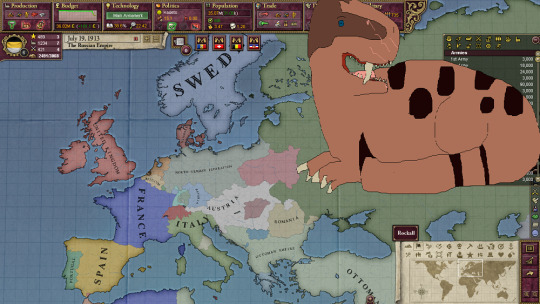
Este nome não poderia ter sido mais apropriado para a minha quinta campanha no Victoria 2, minha nossa até em por essas imagens já tive uma pequena dose de frustração e nem este Inostrancevia saiu como o planejado. Também conhecida como The Song of Pain and Suffer pois neste jogo acento é algo inexistente, vêm a se tratar da minha jogatina com o Império Russo deste 1860 até 1913.
Nesta época de consolidação das potências europeias pelo globo, divisão americana, quebra dos vínculos coloniais paralelamente a sua ampliação minha primeira ação foi conectar todo o país por uma única linha ferroviária ao estilo Transiberiana para facilitar o envio e recebimento de bens de consumo bem como tropas, aprendi feio na campanha com o Peru, além de ter melhorado o setor bélico quando a hora de colonizar a África chegasse já que se você quiser ter respeito neste mundo é necessário ter uma colônia e poder para mante-la em suas mãos.
Se não me falho entre as potências estava Áustria e o Império Otomano que no passar dos anos vieram a ser verdadeiros pés no saco, começarei pelo primeiro. Sendo justo meu alvo para avançar na Europa, visto que rapidamente a Prússia tornou-se a Federação Norte Germânica e ir contra ele séria suicídio, também foi o primogenitor a expandir sua influência no continente embaixo para meu grande desgosto já competição nunca pareceu uma boa ideia, então invadi seu país, destruir seu exército, dancei sob sua capital, rebaixei para poder secundário e ao invés de roubar seu domínio e aumentar a infâmia escolhi anexar parte do seu território, desconhecendo a distancia deste das fronteiras, eventualmente veio a ser meu segundo vassalo a Hungria.

A parte em vermelho representando seu domínio
Em um belo dia, acho que depois de ter colocado a Suécia sob a minha influência o Império Otomano veio causar uma crise diplomática comigo, o motivo sendo minha repressão dos movimentos de resistência polonesa e a principio não dei bola, até que França e Reino Unido entraram em seu apoio e acompanhado a dupla o meu medo de guerra direta, considerando meu estilo expansionista até o momento ( ideologia? Pan-eslavismo) tive de soltar a Polônia como um vassalo monarquista e assim a maior amizade desta campanha iniciou. Mais tarde dei um jeito no malandro, dominei Istambul e o obriguei a entrar no meu círculo de influência e desta forma se seguiu, apesar de sermos aliados não confio nos otomanos em nada, especialmente quando este tomou vantagem da mancada britânica e tomou muito espaço.
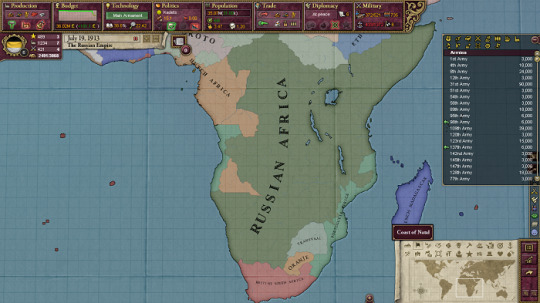
Minha antecipação foi recompensada, pode-se assim dizer
Se fosse para declarar um rival nacional definitivamente séria a Holanda, agora nem tanto, mas em 1884 o cara planejava roubar os terrenos de Portugal . Em meados da década de 70 o bug da cadeira vazia aconteceu significando que não poderia diretamente me envolver em guerras com outros Grandes Poderes ou conflitos no geral até 1912 quando eu aprendi a remover este erro nos códigos do jogo, portanto me aliei com muita gente para ter a chance de anexar alguma coisa, neste contexto melhorei as relações com os portugueses e assim ouvir seu pedido de ajuda com entusiasmo.
Quebrei a Holanda na porrada e defendi o ´´amigo´´, infama subiu e aliança sumiu após disso, entretanto a emoção não morreu pois a Mãe Rússia passou por CINCO tentativas de revoluções socialistas, sem mencionar os movimentos de independência da Estônia, Finlândia, dos anarco-liberais....dos comunistas. Eu até permitiria a mudança de regime se não me custasse prestígio e poderio militar, o que mais temo é ser impopular ao ponto da Inglaterra ou Alemanha decidir me punir na forma de uma coalizão, nestas horas meu velho amigo polaco provou-se valoroso ao sempre enviar tropas as províncias em desordem ao custo da sua própria estabilidade, sempre me apoiar nas guerras mesmo naquelas em outros continentes e ao longo da repetição das estações a simpatia por sua lealdade cresceu em meu ser.
Tantas outras coisas rolaram como minhas duas alianças com o verde-amarelo, China ascendendo para potência secundária junto ao Japão e nossa antipatia mutua um pelo outro, mantive o Alasca e de modo geral o relacionamento com os Estados Unidos manteve-se decente e nunca perdi a esperança de tê-lo como companheiro de batalha, contudo isso não rolava graças as províncias em suas cores e ideologia. Consegui resolver agora a economia é liberal e muitas fábricas fecharam...no ano que vêm volto a antiga.
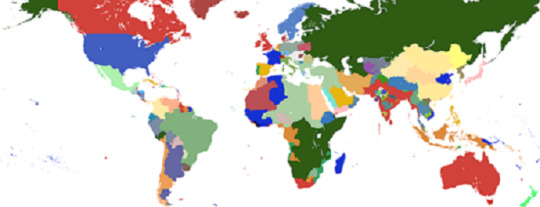
O mundo em 1913, as partes em verde escuro representam a extensão da nação
Atualmente sai de outro conflito com o que? uma pequena fatia do Peru e a consolidação do tratado de defesa mutuo junto ao Ianque, dessa vez tenho mais camaradas como Suíça, Romênia, Bélgica,Sérvia e Sotoko, este último pois a Holanda planeja torna-lo seu, vai sonhando.
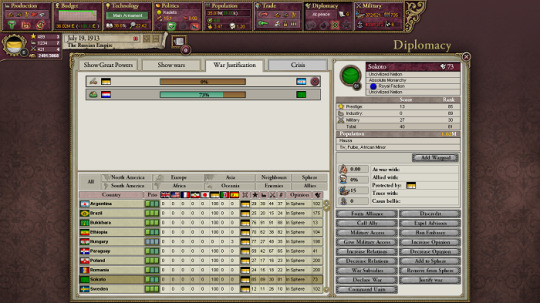
Interrompendo a iniciativa de construir o istmo do Panamá só para cuidar deste corno, embaixo estão alguns dos caras no meu círculo de camaradagem, na realidade o pessoal do qual tenho autoridade.
Sobre o resto do continente, bem acontece a continuação da Guerra Franco-Prussiana e espero que dure o bastante para a economia dos envolvidos quebrar e ai os novos tanques e aviões entrarem em cena haha. Isto não ocorrerá
Antes do final do ano ocorre um erro e Victoria 2 fecha de vez, suponho que não dá para prosseguir além desta barreria decorrente ao grande número de decisões individuais que o jogo precisa calcular para cada país, facção, unidade militar e etc. Vou assumir isso como o fim desta campanha e por consequente historia alternativa que foi bem legal de se narrar.
#Fruhiar Karja#história alternativa#victoria 2#Império Russo#russian empire#em português#1913#inostrancevia#contando uma historia#The song of pain and suffer#A canção da dor e do martírio
1 note
·
View note
Text
Colonialismo
11:42 PM · 3 de fev de 2020 ·Twitter for Android
https://twitter.com/acidadebranca/status/1224478305409216514
THREAD
África sem colonialismo seria bem mais feliz.
No entanto continuaria a ter escravatura, feitiçaria, crianças a serem atiradas aos crocodilos, albinos a serem mortos... e seria um continente com uma noção de ausência de estado e sim de tribos.
África sem colonialismo seria o Sonho do Anarco Liberalismo. Não havia estado. Havia tribos. Certamente havia estados mais fortes que outros como o Mali, o Benim, o Gana, a Etiópia e o Império Swali. O resto era governado através de tribos e de pequenos reinos.
África hoje em dia é resultado directo do colonialismo. Digamos que África vive o Pós-colonialismo. Enquanto os africanos viverem dentro das fronteiras desenhadas a régua e esquadro numa capital europeia nos finais do Séc XIX ainda vivem presos no colonialismo.
Além de muitos países africanos terem nomes que foram escolhidos pelos Europeus como Camarões, Costa de Marfim, Gabão, África do Sul, julgo que a melhor forma dos africanos acabarem com o colonialismo seria eles redesenharem as fronteiras de acordo c/ as etnias e c/ as tribos.
0 notes
Text
Ascensão e Queda do Terceiro Estado
Atrevo-me a comentar uma farpa de Eça de Queiroz, mas não a replicá-la, porque seria um anacronismo responder com 150 anos de atraso, ainda por cima com a história a ajudar na resposta.
Critica o douto escritor o movimento grevista do proletariado da capital de 1872 por dois motivos francamente curiosos. O primeiro por reclamarem de barriga meio-cheia, isto é, não deixando de ter as suas razões para o protesto, perdem-nas quando esquecem outros que se encontram em piores circunstâncias. O segundo por se dedicarem à prosa na defesa dos seus direitos, considerando tal abusivo numa classe de quem trabalha e não de quem, do alto da sua literacia improdutiva, escreve de pleno direito e saber.
É um texto irónico, como é condição comum às farpas, especialmente as de Eça de Queiroz. Mas do pico da sua ironia deixa ainda assim bem patentes as verdades que levaram ao insucesso do liberalismo constitucionalista burguês.
Eça considera-se um membro do terceiro estado, um descendente de Robespierre, um democrata que repudia o privilégio, seja ele real, aristocrático ou sobretudo clerical. Mas o que são estes descendentes de Robespierre, que ridicularizam a monarquia, que atacam impiedosamente o clero, (que permanece, é certo, profundamente miguelista), senão burgueses?
Parece evidente que para os liberais, democratas e até republicanos do constitucionalismo, a principal conquista da revolução e da guerra civil foi a ascensão da burguesia a um poder que até então lhe estava vedado e reservado aos aristocratas e ao parasitismo clerical. Mas mesmo esta burguesia elevada ao poder, que discute as modas do chique parisiense, a saudável educação atlética britânica e até às virtudes do militarismo prussiano, não resiste à ascensão progressiva à odiada condição aristocrática, quer pelo discurso elitista quer mesmo, e com demasiada frequência, pela compra descarada de títulos e comendas que a monarquia falida negoceia a preços de saldo.
O terceiro estado está manifestamente aburguesado e decadente, abrindo assim espaço a um quarto estado emergente, o do proletariado, o povo que Eça reconhece e ainda respeita, embora alertando para os perigos da ascensão da populaça, que ele distingue e manifestamente despreza.
Abaixo do quarto estado ainda existe o camponês, ignorante e miserável, que nem povo chega a ser na sociedade burguesa liberal, relegado à condição de mera besta de carga.
É fascinante a arrogância do argumento utilizado por Eça contra os grevistas: se os oficiais ganham mais que os amanuenses e os primeiros, porque são membros do povo, pouco gastam em representação, isto é não compram roupas finas, não vão ao teatro, não andam de tipóia, não têm filhos a estudar, fazem vida bem melhor do que os segundos, que sendo funcionários públicos e por isso membros da pequena burguesia, se vêem obrigados a despender o seu parco salário em roupas, serviços e divertimentos dignos da sua condição (mas manifestamente além das suas posses) sem esquecer a escolaridade dos filhos.
E o que dizer do supremo argumento que a prosa não é para o proletariado mas tarefa exclusiva das mentes superiores?
É evidente que estávamos bem longe do idealismo revolucionário de 1820, já para não falar no de 1789.
Perante tamanha arrogância da burguesia que se pretendia descendente de Robespierre mas que aspirava ao baronato não haveria como travar a ascensão do socialismo e do anarco-sindicalismo.
O liberalismo queiroziano, por mais republicano e anti-clerical que fosse, suicidou-se com a ascensão da burguesia aos privilégios e ao pedantismo da aristocracia.
E o campesinato, desprezado por todos, o que não morreu à fome, rumou às cidades e à indústria, engrossando o proletariado para as novas revoluções do quarto estado que se adivinhavam, deixando o campo deserto e ao abandono.
0 notes
Text
FOR THE GLORY OF ANCAPISTAN!!!
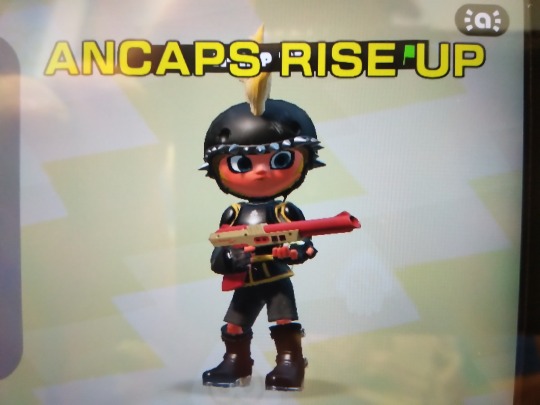
#team chaos#splatfest#splatoon 2#splatoon#final fest#ancap#ancapistan#anarcocapitalismo#anarco capitalism#anarchocapitalism#libertarianism#libertarian#libertad
21 notes
·
View notes
Text
Someone: I think the anarco-capitalistic sistem will definitely solve our current economical problems.
Me: I think some alcohol will definetley solve my current urge to throw books at you.
2 notes
·
View notes
Text
Though Andean history has been described as a permanent space of insurrection by Steven Sandor John and others, anarchism itself is often code for Occidental and Western European forms of social organization. [...] What anarchisms otherwise emerge to delink from European histiography? [...] Mujeres Creando Comunidad was founded by Julieta Paredes, Maria Galindo and Monica Mendoza in 1985 during the “transition to democracy” period in Bolivia and at a time of hyperinflation in the nation during the onset of privatization and deregulation: the period described as neoliberalism. Though this group split into two different feminist groups after the co-founders went their own ways in 2002, the feminist anarchist vision and trans-feminist perspective poses a meaningful challenge to patriarchy, coloniality, and to the many forms that nationalism takes. During the neoliberal period when corporate restructuring influences political agendas in unprecedented ways, and the coercive power of intimidation and violence has intensified dispossession and lack of freedoms, looking to anarchist, feminist, Indigenous activisms [...] offers us a window into important practices of refusal. [...] These modes of activity provide a dual track that at once denounces colonial modes of governance and authority, and also imagines and makes new worlds outside of the intimate, public, and state logics of coercion. [...]
Elite women often focused on literary salons and suffrage rights following European models. As working class mestizas and Indigenous women entered the labor market in vast numbers during industrialization, they initially organized themselves to improve their material and labor conditions. As Lourdes Zabala details in Mineras, Cholas, and Feministas / Miners, Cholas, and Feminists (1976 - 1991), during the twentieth century anarchism became the route for many kinds of Indigenous labor activism (1993). As women organized with men to achieve the eight-hour workday, to liberate prisoners, and to improve wages, they also developed a specifically anti-state and feminist agenda (Zabala 29). [...]
During capitalist expansion, rural to urban migration produced dramatic racial and labor segmentation within La Paz’s social fabric. The Chola market woman, an Indigenous and mestiza figure, increasingly participated in spheres of commercial exchange as a powerful and visible presence that organized, sold, and bartered through systems that were not always legible to capitalism. Of Aymara descent, and to a certain extent urbanized, the chola accrued representational visibility as a mediator of culture, and, within literature and imagery, as an icon of the Bolivian nation (Poole 1997).
Yet, the chola was also the target of anti-Indigenous racism by the European elite that wanted to construct their own modernity.
Importantly, these women managed to retain many of the social and economic features of Indigenous Andean societies, such as the horizontal kinship structure of the Incan system, the ayullu that was the mainstay of Indigenous society, even after the onset of colonialism. For example, as scholars have rightly noted, these rhizomatic structures supported flexible and mobile tactics that were used during the anti-state gas and water wars in the early 2000s.
Yet what has been underplayed is the degree to which chola market women maintained horizontal structures of decision making and bartering in ways that predate Western anarchist formations. [...]
During the early part of the 20th century until the present day, Indigenous women continue to wear traditional polleras (Indigenous skirts and petticoats), often facing workplace discrimination for cultural practices that included wearing Indigenous clothes in public. Since the 1920s, cholas have impressively intertwined labor concerns with anti-racist work, anti-state politics, market organizing, and anti-discrimination efforts [...]. As Lourdes Zabala details, chola market women challenged upper-class women on issues such as “couple violence [...], the defense of free love, absolute divorce, and the rejection of civil marriage” [...].
Aymara sociologist and activist Sylvia Rivera Cusicanqui has threaded together how the history of anarchism was contained and obscured [...]. As she explains:
What happened in Bolivia is that there have been two official histories: The official history written by the [Revolutionary] Nationalist Party [...] and the [...] eclipsing or distorting the autonomous history of anarchist unions. It’s the links between the anarchists and Indigenous people that gave them another nuance, because their communities are self-sustained entities and they basically are places where anti-authoritarian type of organization can take root. [...]
Victoria Aldunate Morales describes what it means to do the daily work of anarchist feminisms: [...] “[This requires an] opening one’s eyes in ways that cannot be closed again [...].”
These references to the realm of vision are not just about seeing coloniality directly, but about how to sense and live the future through a communal solidarity of the now. [...]
During the 1990s graffitis, or las pintadas -- signature political quotes written in distinctive cursive writings on city walls -- became an important format that illustrated how Mujeres Creando perforated the dominant visual field.
As visual disobedience, the graffitis painted an Indigenous anarchist feminist imaginary onto the urban landscape by marking terrain not through any capitalist indication, such as real estate speculation or the building of new infrastructure or signs of gentrification, but instead through the embodied political improvisation of the written word. [...]
I first visited the site of Maria Galindo’s radio program, and the cafe run by local Aymara and Quechua women, in 2013. When I walked into the crowded two-story colonial house, where lunch patrons were tucked into their wooden tables busy eating steaming bowls of Andean potato quinoa soup, I was visually overwhelmed by an enormous, gorgeous photographic image plastered onto the adobe wall of an Indigenous woman with braids. Below her was a question -- “What does racism look like to you?”
-------
Macarena Gomez-Barris. “Anarchisms Otherwise: Pedagogies of Anarco-Indigenous Feminist Critique.” Anarchist Developments in Cultural Studies. May 2021.
81 notes
·
View notes
Text
¿Qué significa la bandera roja-negra? / what does the red and black flag mean?
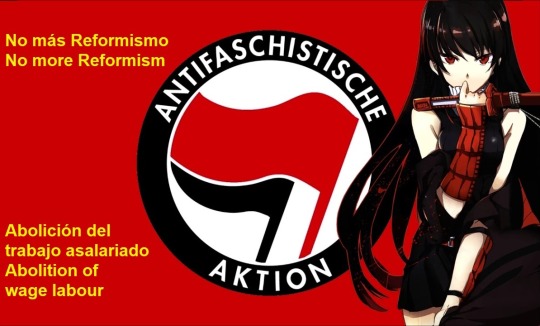
La bandera rojo y negra significa la unión entre trabajadores asalariados conconciencia de clase (marxistas libertarios) y anarquistas que han aceptado muchas de las ideas de Marx (anarco comunistas)
Tal como lo quizo Marx en sus congresos y en la Internacional. Eso de que Bakunin provocó un cisma y todos los anarquistas se fueron con él, es un tanto mitologico por parte de los anarquistas no marxistas.
Con el paso del tiempo, hubo un cisma ideologico entre anarquistas puros y los anarco comunistas; ya que Pietor Propotkin concienzudamente pudo encontrar la solución al capitalismo (abolir el trabajo asalariado) pero desarrolló una teoría flaca, muy idealizada en el sentido filosófico, es decir, no muy material.
Después, llegó la Praxis en la revolución de Octubre de Rusia y el levantamiento de KRONSDAT, en donde, los comunistas libertarios y anarco comunistas se volvieron a unificar porque estaban hartos del burocratismo de Lenin y la perdida de las libertades de los trabajadores en donde los soviets ya no contaban, e hicieron la delaración o manifiesto "Todo el poder a los soviets, ningún poder a los partidos".
Como el movimiento esta integrado tanto por comunistas libertarios y anarquistas, causa algo de confusión porque surgen diferencias, puntos de vista distintos; incluso algunas organizaciones anarco comunistas son más anarquistas puros que comunistas libertarios, esto a veces se manifiesta en que la bandera negra es más resaltada que la roja.
The red and black flag signifies the union between class-conscious salaried workers (libertarian Marxists) and anarchists who have accepted many of Marx's ideas (anarcho communists). Just as Marx wanted it in his congresses and in the International. That Bakunin caused a schism and all the anarchists went with him, is somewhat mythological on the part of non-Marxist anarchists. With the passage of time, there was an ideological schism between pure anarchists and anarcho communists; since Pietor Propotkin conscientiously could find the solution to capitalism (abolish wage labor) but developed a thin theory, very idealized in the philosophical sense, that is, not very material. Then came the Praxis in the October revolution in Russia and the uprising of KRONSDAT, where the libertarian communists and anarcho communists were unified again because they were fed up with Lenin's bureaucratism and the loss of workers' freedoms where the Soviets no longer counted, and they made the declaration or manifesto "All power to the Soviets, no power to the parties." as the movement is composed of both libertarian communists and anarchists, it causes some confusion, because differences arise, different points of view; some anarcho-communist organizations are more pure anarchists than libertarian communists, this sometimes manifests itself in that the black flag is more prominent than the red

#otaku#anime#anarcho communism#libertarian communism#mutualismo#mutualism#libertarian marxist#proletarios#proletariat#otaku socialismo#socialism anime#communism anime#mutualism anime#otaku mutualismo
2 notes
·
View notes